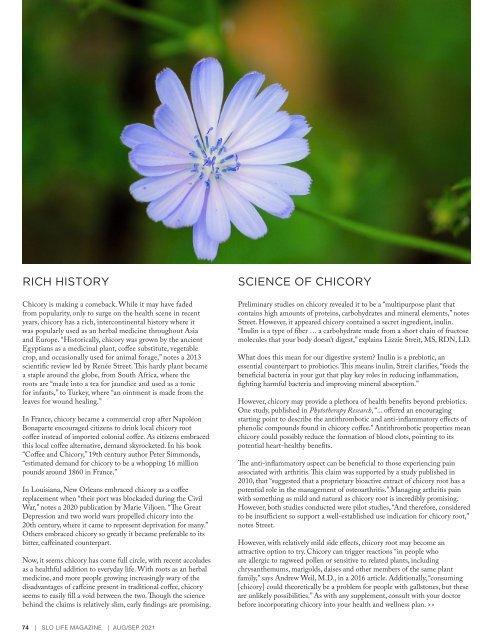You also want an ePaper? Increase the reach of your titles
YUMPU automatically turns print PDFs into web optimized ePapers that Google loves.
RICH HISTORY<br />
Chicory is making a comeback. While it may have faded<br />
from popularity, only to surge on the health scene in recent<br />
years, chicory has a rich, intercontinental history where it<br />
was popularly used as an herbal medicine throughout Asia<br />
and Europe. “Historically, chicory was grown by the ancient<br />
Egyptians as a medicinal plant, coffee substitute, vegetable<br />
crop, and occasionally used for animal forage,” notes a 2013<br />
scientific review led by Renée Street. This hardy plant became<br />
a staple around the globe, from South Africa, where the<br />
roots are “made into a tea for jaundice and used as a tonic<br />
for infants,” to Turkey, where “an ointment is made from the<br />
leaves for wound healing.”<br />
In France, chicory became a commercial crop after Napoléon<br />
Bonaparte encouraged citizens to drink local chicory root<br />
coffee instead of imported colonial coffee. As citizens embraced<br />
this local coffee alternative, demand skyrocketed. In his book<br />
“Coffee and Chicory,” 19th century author Peter Simmonds,<br />
“estimated demand for chicory to be a whopping 16 million<br />
pounds around 1860 in France.”<br />
In Louisiana, New Orleans embraced chicory as a coffee<br />
replacement when “their port was blockaded during the Civil<br />
War,” notes a 2020 publication by Marie Viljoen. “The Great<br />
Depression and two world wars propelled chicory into the<br />
20th century, where it came to represent deprivation for many.”<br />
Others embraced chicory so greatly it became preferable to its<br />
bitter, caffeinated counterpart.<br />
Now, it seems chicory has come full circle, with recent accolades<br />
as a healthful addition to everyday life. With roots as an herbal<br />
medicine, and more people growing increasingly wary of the<br />
disadvantages of caffeine present in traditional coffee, chicory<br />
seems to easily fill a void between the two. Though the science<br />
behind the claims is relatively slim, early findings are promising.<br />
SCIENCE OF CHICORY<br />
Preliminary studies on chicory revealed it to be a “multipurpose plant that<br />
contains high amounts of proteins, carbohydrates and mineral elements,” notes<br />
Street. However, it appeared chicory contained a secret ingredient, inulin.<br />
“Inulin is a type of fiber … a carbohydrate made from a short chain of fructose<br />
molecules that your body doesn’t digest,” explains Lizzie Streit, MS, RDN, LD.<br />
What does this mean for our digestive system? Inulin is a prebiotic, an<br />
essential counterpart to probiotics. This means inulin, Streit clarifies, “feeds the<br />
beneficial bacteria in your gut that play key roles in reducing inflammation,<br />
fighting harmful bacteria and improving mineral absorption.”<br />
However, chicory may provide a plethora of health benefits beyond prebiotics.<br />
One study, published in Phytotherapy Research, “... offered an encouraging<br />
starting point to describe the antithrombotic and anti-inflammatory effects of<br />
phenolic compounds found in chicory coffee.” Antithrombotic properties mean<br />
chicory could possibly reduce the formation of blood clots, pointing to its<br />
potential heart-healthy benefits.<br />
The anti-inflammatory aspect can be beneficial to those experiencing pain<br />
associated with arthritis. This claim was supported by a study published in<br />
2010, that “suggested that a proprietary bioactive extract of chicory root has a<br />
potential role in the management of osteoarthritis.” Managing arthritis pain<br />
with something as mild and natural as chicory root is incredibly promising.<br />
However, both studies conducted were pilot studies, “And therefore, considered<br />
to be insufficient so support a well-established use indication for chicory root,”<br />
notes Street.<br />
However, with relatively mild side effects, chicory root may become an<br />
attractive option to try. Chicory can trigger reactions “in people who<br />
are allergic to ragweed pollen or sensitive to related plants, including<br />
chrysanthemums, marigolds, daises and other members of the same plant<br />
family,” says Andrew Weil, M.D., in a 2016 article. Additionally, “consuming<br />
[chicory] could theoretically be a problem for people with gallstones, but these<br />
are unlikely possibilities.” As with any supplement, consult with your doctor<br />
before incorporating chicory into your health and wellness plan. >><br />
74 | <strong>SLO</strong> <strong>LIFE</strong> MAGAZINE | AUG/SEP <strong>2021</strong>

















